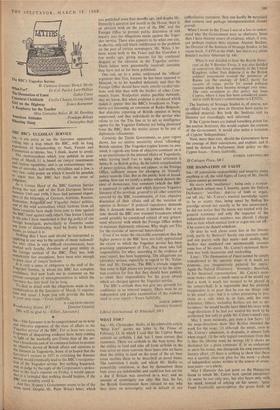Sik,--The Spectator is to be congratulated on its bold and
objective exposure of the state of affairs in the Yugoslav service of the BBC. For at least two years, fragments of disquieting evidence have been coming t° light of the markedly pro-Titoist bias of the ser- vice's broadcasts and of its continual failure to present an objective survey of British affairs and opinions to the listeners in Yugoslavia. Some of us hoped that the SPectator's success in 1957 in criticising the Russian service would eventually lead to the BBC's reorganisa- tion of the Yugoslav service. But nothing happened, and, to judge by the reply of the Corporation's spokes- Man to the Star's reporter on Friday, it would appear that it is intended that nothing should happen, if the BC can possibly avoid it. And Her Majesty's Government seems to be of the same mind. Despite Mr. Peter Wiles's letter, which
you published some four months ago, and despite Mr. Donnelly's question last month in the House, there is an obvious wish on the part of the BBC and the Foreign Office to prevent public discussion of and inquiry into the allegations made against the Yugo- slav service. There also appears to be what one can, in charity, only call blank indifference to the problem on the part of certain newspapers. Mr. Wiles, I be- lieve, wrote both to the Times and the Guardian a few weeks ago, giving reasons for his continued disquiet at the situation in the Yugoslav service. These letters were presumably received; certainly they have not so far been published.
One can, up to a point, understand the 'official' argument that Tito, because he has been opposed to Moscow, is to be handled delicately and that the Foreign Office should have more overtly cordial rela- tions with him than with the leaders of other Com- munist States. Realpoliiik makes peculiar demands. that we know. But when evidence is produced which makes it appear that the BBC's broadcasts to Yugo- slavia are becoming an extension of Radio Belgrade, that objective reporting of British opinion is being suppressed, and that individuals in the service who refuse to toe the Tito line or to act as intelligence agents for the Yugoslav Embassy are being dismissed from the BBC, then the matter ceases to be one of diplomatic refinements.
Certainly the Titoist Government, as your report shows, has no similar sensitivity about 'offending' British opinion. The Yugoslav regime knows its own mind; it regards any form of objective comment on it as an interference in the internal affairs of Yugoslavia, while leaving itself free to make what strictures it thinks fit on British policy. In the'subtle complications of power-politics, this may not appear, to the Foreign Office, sufficient reason for changing its 'friendly' policy towards Tito. But in the public field of broad- casting, how can we justify a policy which distorts the ideal of democratic, free comment (which the BBC is supposed to uphold) and which deprives Yugoslav listeners of the privilege, granted to all other countries covered by the BBC transmissions, of free, objective discussion of their affairs and of the varieties of opinion in Britain? If political expediency demands this, it demands much more; it demands that at no time should the BBC ever transmit broadcasts which could possibly be considered critical of any govern- ment whatever with which the Foreign Office wishes to maintain diplomatic relations. Why single out Tito for the exercise of universal benevolence?
Even if we make the charitable assumption that the higher powers in the BBC have not fully appreciated the extent to which the Yugoslav service has been practising appeasement of Tito, they must take full responsibility for what, according to the evidence of your report, has been happening. The allegations arc extremely serious, especially in regard to Mr. Valen- tine and Mr. Gregovic. The BBC's attitude suggests that some in high places are prepared to let the situa- tion continue for fear that they should have publicly to admit their responsibility for the grave abuses which are charged against the Yugoslav service.
The BBC's attitude does not give any grounds for confidence in an internal inquiry. There must be an independent and public examination of the evidence cited in your report.—Yours faithfully,
DERICK MIRFIN
Secretary-General Liberal International, 45 Whitehall, SW 1


































 Previous page
Previous page